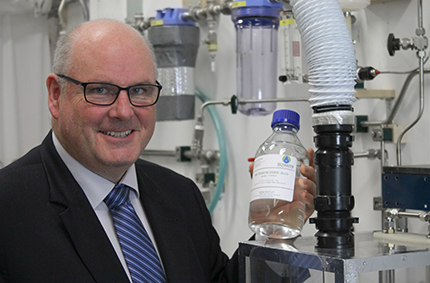Nuclear industry offers clean‑energy solutions
As the world looks for sources of clean energy and develops clean technologies to combat climate change, the Canadian nuclear industry is putting a renewed focus on exports of its products and services.
Canada has long been a global leader in nuclear research and technology, developing and exporting reactors and their components as well as radioisotopes used in various applications including medical diagnosis, cancer therapy and advanced materials manufacturing.

“There’s great opportunity for Canada,” says John Barrett, president and chief executive officer of the Canadian Nuclear Association (CNA). The association provides advocacy and analysis for Canada’s nuclear industry along with a sister group, the Organization of Canadian Nuclear Industries (OCNI). According to the OCNI, Canada’s nuclear industry generates $1.6 billion in exports—$6 billion in sales in the sector overall—and employs about 40,000 Canadians.
Barrett hopes there will be a greater recognition of the ability of nuclear technology to “close the emissions gap” and be a “fantastically reliable” part of what he calls the clean‑energy menu. “Nuclear is both clean infrastructure and clean technology, and would benefit by being included in International Trade’s priority focus on Canada’s cleantech exports,” he comments.
“As a citizen of the world, I want the world to embrace nuclear as a way to get off of fossil fuels,” Barrett says, adding Canada’s nuclear industry is determined to declare that message globally. “We all have to be part of the answer.”
With assistance from the Canadian Trade Commissioner Service (TCS), companies and organizations in the sector are finding a wide range of markets abroad in the highly regulated field.
“It is a great success story,” says Barrett, noting that Canada has long been a pioneer in the market and today there is “quite an assortment” of fields that nuclear industries are involved in at home and abroad. “We’re just at the tip of the iceberg in terms of what nuclear technology can provide. There’s some impressive technologies and some revolutionary changes coming,” he says. Examples range from medical imaging to Small Modular Reactors (SMRs) that have potential applications in replacing coal‑fired power plants, as a source of non‑emitting heat and power for industry and to generate reliable electricity or to provide an efficient and clean source of heat in remote and northern areas.

Andrew Stuart, president and CEO of Isowater Corp., holds a bottle of deuterium oxide.
(Photo courtesy of Isowater Corp.)
Barrett says the TCS assists nuclear companies abroad, from seeking out markets to assisting with complex export controls, as well as representing the industry in dealing with foreign governments and companies. “It’s an area where the perception of quality and safety of the technology are very important,” he notes.
Jonathan Lundy is vice president of strategy and business services for BWXT Canada Ltd., a company based in Cambridge, Ont., involved in heavy nuclear manufacturing, especially as part of the CANDU fleet of reactors at home and abroad. “Canada has developed a unique nuclear technology, which makes it well known around the world,” he says.
“The TCS is good for us and it’s good for the whole nuclear industry,” says Lundy. His firm, which has 1,100 employees in Canada, currently does about 10 percent of its annual business abroad—but that can expand to 30 percent when there are major international sales. Trade commissioners in different markets help streamline regulatory processes and assist with government‑to‑government interactions, he says. “The TCS fulfills a really interesting role and a very helpful role and they’re good at it.”
Song‑Min Cho, a trade commissioner responsible for nuclear industries support as part of the infrastructure team at Global Affairs Canada in Ottawa, says Canada has a “tried and true” reputation associated with the CANDU reactor program, which continues to have great potential—alongside emerging markets for new technologies such as SMRs.
Priority markets for sales of CANDU reactors and their components, both for new builds and for refurbishment projects, include China, Argentina, Romania and the United Kingdom, Cho says.
The TCS collaborates with the OCNI on trade missions abroad in the sector, he says, which introduces foreign buyers—both from the private sector and from government—to Canadian companies and their capabilities.
“With nuclear infrastructure, you have to show yourself to clients regularly and the opportunities will be converted into contracts,” Cho says. “They want to see that the Government of Canada stands behind the industry.”
Andrew Stuart, president and chief executive officer of Isowater Corp. in Collingwood, Ont., says the support of the TCS is critical to his business, which supplies deuterium oxide—or heavy water—to the life sciences, high technology and environmental science sectors.
The company was formed in 2009 and today more than 95 percent of its products are sold in some 13 countries abroad, with uses that include pharmaceuticals, diagnostics, hydrology, cosmetics, fibre optics, semiconductors, scientific research and manufacturing.
“It’s a market that’s growing significantly, and we have found great success internationally,” Stuart says. “We’re connecting a traditional nuclear product to non-nuclear markets and a clientele base which is much smaller in demand but there are many, many different applications.”
He says the company’s greatest marketing tool is its website, because there are so many global players looking for sources of heavy water for different purposes. Once a transaction is in progress the TCS “offers great assistance,” he says, validating that the customer “is qualified to purchase and handle the product for its stated purpose” and helping with extensive export control regulations.
“We require that for every single export sale we make,” says Stuart, noting that the process can take anywhere from three weeks to six months or more in far‑off places. “It’s very important that we get local support there.”
Stuart sees the market growing significantly. “Our focus is to ensure a strong deuterium supply chain so our clients can grow their own businesses,” he says, noting that the TCS is important in that equation. “The TCS really expands the reach of small and medium enterprises. We simply cannot have the global coverage which much larger companies routinely have.”
In terms of where the nuclear industry is going, Lundy would like to see Canada “break new ground” in export markets, which requires a strong commitment by the federal government to nuclear technology domestically as well as abroad.
“We want a coherent policy that will help the whole industry,” he says. “The technology is compelling, and we do get good government support in our efforts internationally.”
Barrett notes that the ongoing effort to refurbish Ontario’s nuclear generating stations is helpful in dealing with potential foreign customers. “They want to see a robust industry back in the supplier country; that makes your supply chain healthy and reliable.”
Subscribe to: CanadExport
- Date Modified: